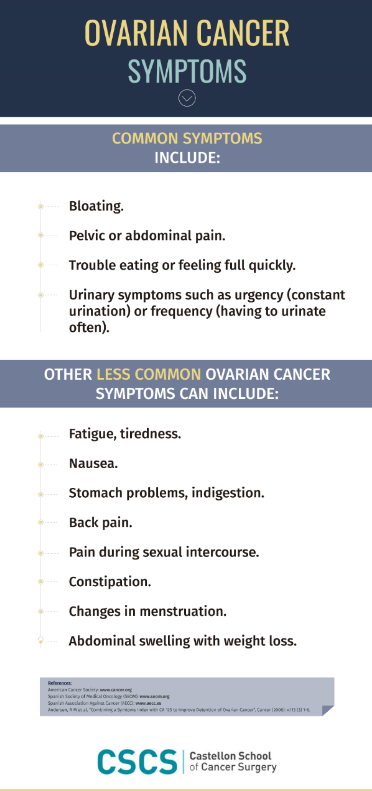What can be the symptoms of ovarian cancer?
Ovarian cancer can be hard to find in the earliest stages, as women are more likely to have symptoms when the disease has spread beyond the ovaries. However, it can be detected because, sometimes, even at an early stage, it can be manifested through different signs and symptoms. Common symptoms may include:
- Bloating. If the swelling is accompanied by a weight loss is more likely to be cancer.
- Pelvic or abdominal pain. If the pain is frequent and does not seem to have an explanation, it is recommended to go to the gynecologist.
- Trouble eating or feeling full quickly. Feelling full quickly is another symptom, which leads to rapid weight loss.
- Urinary symptoms such as urgency (constant urination) or frequency (having to urinate often). In most cases suffering from this symptom is due to a urinary infection, but it is recommended to go to the specialist if these anomalies persist.
If these symptoms occur, it does not mean that you have the disease, since they can also be caused by benign diseases. However, when caused by ovarian cancer, these symptoms tend to occur more frequently.
Other less common ovarian cancer symptoms can include:
- Fatigue, tiredness. Many times fatigue is caused by stress situations and is associated with benign diseases; But if the fatigue is prolonged it can be a symptom of ovarian cancer.
- Nausea and stomach problems, indigestion.
- Back pain. When the pain is located in the lower back, it may indicate that cancer is present.
- Pain during sexual intercourse. If it occurs repeatedly you should go to the gynecologist to see what is the cause.
- Constipation. Normally this symptom has to do with dietary factors, but it can also be due to other causes such as ovarian cancer or colon cancer.
- Changes in menstruation. This symptom may be the cause of many other factors, but it is advisable to see the specialist if they are frequent.
- Abdominal swelling with weight loss.

Presenting these symptoms does not mean that you have ovarian cancer, but it is appropriate to go to the gynecologist to determine what happens.
——–
References:
American Cancer Society: www.cancer.org
Spanish Society of Medical Oncology (SEOM): http://www.seom.org/
Spanish Association Against Cancer (AECC): www.aecc.es
Andersen, R M et al. “Combining a Symtoms Index with CA 125 to Improve Detention of Ovarian Cancer”. Cancer (2008): v.113 (3) 1-6.

